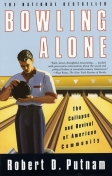BKMT READING GUIDES
Bowling Alone : The Collapse and Revival of American Community
by Robert D. Putnam
Paperback : 544 pages
1 club reading this now
0 members have read this book
Drawing on vast new data that ...
Introduction
Once we bowled in leagues, usually after work—but no longer. This seemingly small phenomenon symbolizes a significant social change that Robert Putnam has identified in this brilliant volume, which The Economist hailed as “a prodigious achievement.”
Drawing on vast new data that reveal Americans’ changing behavior, Putnam shows how we have become increasingly disconnected from one another and how social structures—whether they be PTA, church, or political parties—have disintegrated. Until the publication of this groundbreaking work, no one had so deftly diagnosed the harm that these broken bonds have wreaked on our physical and civic health, nor had anyone exalted their fundamental power in creating a society that is happy, healthy, and safe.
Like defining works from the past, such as The Lonely Crowd and The Affluent Society, and like the works of C. Wright Mills and Betty Friedan, Putnam’s Bowling Alone has identified a central crisis at the heart of our society and suggests what we can do.
Editorial Review
Few people outside certain scholarly circles had heard the name Robert D. Putnam before 1995. But then this self-described "obscure academic" hit a nerve with a journal article called "Bowling Alone." Suddenly he found himself invited to Camp David, his picture in People magazine, and his thesis at the center of a raging debate. In a nutshell, he argued that civil society was breaking down as Americans became more disconnected from their families, neighbors, communities, and the republic itself. The organizations that gave life to democracy were fraying. Bowling became his driving metaphor. Years ago, he wrote, thousands of people belonged to bowling leagues. Today, however, they're more likely to bowl alone:Television, two-career families, suburban sprawl, generational changes in values--these and other changes in American society have meant that fewer and fewer of us find that the League of Women Voters, or the United Way, or the Shriners, or the monthly bridge club, or even a Sunday picnic with friends fits the way we have come to live. Our growing social-capital deficit threatens educational performance, safe neighborhoods, equitable tax collection, democratic responsiveness, everyday honesty, and even our health and happiness.The conclusions reached in the book Bowling Alone rest on a mountain of data gathered by Putnam and a team of researchers since his original essay appeared. Its breadth of information is astounding--yes, he really has statistics showing people are less likely to take Sunday picnics nowadays. Dozens of charts and graphs track everything from trends in PTA participation to the number of times Americans say they give "the finger" to other drivers each year. If nothing else, Bowling Alone is a fascinating collection of factoids. Yet it does seem to provide an explanation for why "we tell pollsters that we wish we lived in a more civil, more trustworthy, more collectively caring community." What's more, writes Putnam, "Americans are right that the bonds of our communities have withered, and we are right to fear that this transformation has very real costs." Putnam takes a stab at suggesting how things might change, but the book's real strength is in its diagnosis rather than its proposed solutions. Bowling Alone won't make Putnam any less controversial, but it may come to be known as a path-breaking work of scholarship, one whose influence has a long reach into the 21st century. --John J. Miller
Discussion Questions
No discussion questions at this time.Book Club Recommendations
Recommended to book clubs by 0 of 0 members.
Book Club HQ to over 90,000+ book clubs and ready to welcome yours.
Get free weekly updates on top club picks, book giveaways, author events and more








